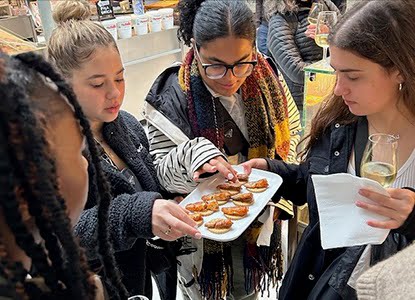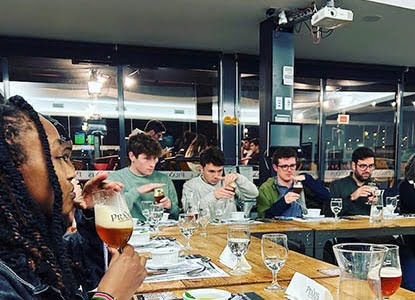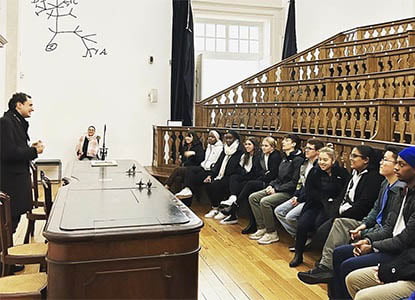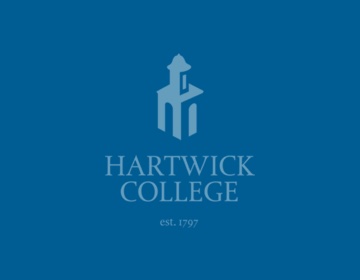Portugal Provides ‘Fresh’ Learning for J Term Contingent
by Libby Cudmore
Halfway around the world, Ariely Alberto ‘25 felt like she was at home.
Dining with legendary cheese maker Adolfo Henriques at his farm in Maçussa, Portugal, Ariely was taken by how fresh the food was.
“It reminded me of visiting my grandparents in the Dominican Republic,” she said. “They raise chickens in their backyard and make everything from scratch. The food we ate was authentic, making me feel like I was eating with family.”
Ariely was one of 15 students who participated in the “Fermentation and Re-Localization of Food Sources” J Term course in Portugal, led by Professors Carli Ficano, economics, and Mary Allen, biology.
The course incorporated both disciplines, allowing students to learn about microbes that use fermentation for growth, and how producers use them in producing foods, with a focus on local food systems and food re-localization.
As a nursing major, Ariely knew that her clinicals would make it challenging to embark on a J Term abroad in the coming years. So last fall, she began looking for courses with fellow nursing student, Bangely Garcia ‘25.
“We both come from the Dominican Republic, so we really related to being in touch with food and culture,” Garcia added. “We wanted to see how other people related to theirs.”
With a focus on craft and locally made food, the class ate and drank their way across the country, learning how cheese, wine, beer and meat delicacies are made in different regions.
“The food is so fresh, it feels like you’re eating it straight off the tree,” said Ariely.
“One of the things that we tried to emphasize is the tie these foods have to the culture and heritage of the region where they’re made,” Allen explained.
Some of the foods they tried even have a Protected Designation of Origin (PDO) label to certify that the food – port wine, for example – was produced in a specific region. Only wines from the Douro Valley can be designated as port wine.
“If there’s a cheese with a PDO label, sometimes it will tell you that it came from this farm, from these goats,” said Ariely. “It gives it that market power.”
In addition to learning about traditional foods, they also saw how new innovators are reviving traditions and bringing them into the 21st century.
In Coimbra, they enjoyed a beer-pairing dinner at Praxis, the first microbrewery in Portugal. “It was the rebirth of a brewery that had been there since the early 1900s but closed in the 1980s,” said Allen. “It was an important gathering space, so the founders of Praxis wanted to bring that back and host a lot of community gatherings.”
Craft beer is relatively new to Portugal and the founders of Praxis believe that the water of Coimbra makes for exceptionally good beer.
“In a location with good natural resources, combined with craft and ingenuity, producers can create something unique,” Allen attested.
And just because Portugal is rooted in tradition doesn’t mean its citizens aren’t looking to the future.
“Adolfo was working with Portuguese food scientists to learn how to incorporate algae into cheese-making,” said Allen. “Adolfo was the first person to produce a traditional, French-style goat cheese in Portugal, but he’s also always looking to the future for new ways to develop sustainable food sources.”
“The people who make these foods don’t see it as a job,” said Bangely. “They see it as a way to share their craft with the community.”




